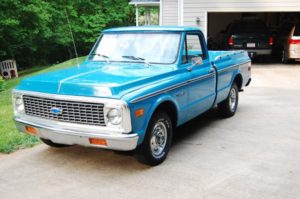Cookie Use Policy and Affiliate Link Info
This site uses cookies and continued use of the site acknowledges your acceptance of this policy. For details, visit the Classic Cars Online US About Page.
As an FYI: Affiliate links are used in several places around the site as part of the site’s advertising efforts, and while ads are what keeps our ‘doors open’, clicking the links does not in any way impact the cost of items you might purchase from advertisers.
Comparison of Diesel and Gasoline Engines
by: John Stafford

In the transportation industry there are two major types of engines. These are the diesel engine and the gasoline engine. The diesel engine can be found more commonly in the larger vehicles such as buses and trucks but the gasoline engine has remained the most popular engine in cars. There reason for this may not be clearly apparent at a first glance as it seems that the only difference in the engines is the fuel type. This is however a large misconception as the inner workings of the engines also differs.
There are however some overlapping areas. These include areas that can be used by manufacturers to produce the best vehicle engine in terms of efficiency and power. The two types of engines are similar in terms of the fact that they both contain cylinders. The number of cylinders however may vary from engine to engine and is largely determined by the make of the vehicle they are designed for.
There are three main configurations that the cylinders are arranged in. These are the inline, the V or the flat. The inline design has the cylinders arranged in a line in one bank. The V design sets the cylinders at opposing angles and they form the V shape to one another. The flat design also called the boxer or horizontal design sets the cylinders horizontally opposed. The configuration chosen is dependent on the car as the advantages and disadvantages can vary.
Another similarity is the combustion cycle. There are four stroke combustion cycles that are very much similar in the two engine designs. These strokes are the intake, compression, combustion and the exhaust strokes. These strokes are almost identical in the two engine types and can be seen to be the cycle by which the engines operate to produce power. The two engines also have a crankshaft that is used to open and close the valves in the combustion cycle.
While the fuel type remains the largest difference between the diesel and gasoline engines it is not the only difference. The fuel differences however are based on the combustion ratios at which the fuels will combust or explode. The gasoline will not self-ignite as there is not enough heat generated for combustion to occur. This is why there is the need for a spark plug that causes the explosion that is necessary. The diesel however requires no spark plug and will ignite when compressed.
Diesel engines therefore have much higher compression pressures than the gasoline engines. This difference is due to the fact that air alone is compressed in the diesel engine and therefore the fuel goes directly into the cylinder and allows the compression ratio to be much higher.
It is seen that the fuels also differ in the amount of carbon and hydrogen atoms. The diesel fuel has more carbon and hydrogen atoms than the gasoline making it more energy dense than the gasoline and therefore providing more energy per gallon when compared to gasoline.
In terms of efficiency it can be seen that the two engine types vary significantly from one another. It can be argued that the diesel engine is the more efficient of the two engine types. There are however some drawbacks to the diesel engine in terms of environmental issues as well as noise.
| About The Author
John Stafford is the webmaster for http://www.diesel-generator-central.com Visit http://www.diesel-generator-central.com to research your next diesel engine or diesel generator then purchase from one of our wide range. http://www.diesel-generator-central.com offers experienced and professional advice to assist you in your next diesel decison. |
Article Source: Article CIty
Written by Laure
 Classic Cars Online US
Classic Cars Online US
- The Studebaker Company: A Journey from Wagons to Wheels
- Revolutionizing the Road: Unveiling the 1932 Studebaker President and Commander
- The Art Deco Revolution: How 1930s Automotive Design Embraced Luxury and Modernity
- Unveiling the Pontiac Chieftain: A Journey Through Its Iconic Generations
- The Iconic 1960 Chevy Bel Air: Evolution, Design, and Enduring Legacy
- The Timeless Elegance of the 1960 Chevy Bel Air: Exploring its Interior and Exterior Features
- The Enduring Charm of the Chevy Bel Air: A Classic Evolution
- Exploring the Iconic 1962 Chevy Nova: Specs, Features, and Historical Significance
- The Evolution of Chevrolet Nova: Exploring Generations, History, and Impact
- The Evolution of the Chevy Nova
